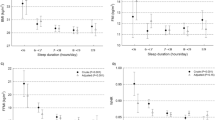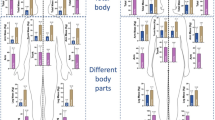Abstract
Background:
Many recent studies have highlighted the complex interaction between sleep duration, food intake and metabolic balance. Although a causal link is yet to be established, emerging evidence suggests that short sleep duration may alter the balance between energy intake and energy expenditure. Thus far, most research has focussed on the link between sleep duration and carbohydrate metabolism. The role of sleep duration in fat intake and vice versa remains relatively unknown.
Objective:
The aim of this analysis was to determine whether there exists a significant association between sleep duration and fat intake.
Design:
Data from 2828 adults living in Jiangsu province, China, collected during a national survey of nutrition and health conducted in 2002.
Results:
The analysis showed a statistically significant association between sleep duration and fat and carbohydrate intake but not protein or fasting blood glucose. Those who slept for less than 7 h a day had significantly higher (P=0.005) percentage of energy from fat intake than those who slept for 7–9 h per day. Analysis of the influence of high fat intake upon sleep demonstrated a trend to reduced sleep duration between the highest and lowest quartiles of fat intake (P=0.056).
Conclusions:
To our knowledge, this is the first data from a large cross-sectional study to show an association between decreased sleep duration and increased fat intake in humans. Given the trend towards decreased sleep duration in modern societies and the parallel obesity epidemic, the significance of this association warrants more research.
This is a preview of subscription content, access via your institution
Access options
Subscribe to this journal
Receive 12 print issues and online access
$259.00 per year
only $21.58 per issue
Buy this article
- Purchase on Springer Link
- Instant access to full article PDF
Prices may be subject to local taxes which are calculated during checkout
Similar content being viewed by others
References
Aparecida Crispim C, Zalcman I, Dattilo M, Guarita Padilha H, Edwards B, Waterhouse J et al. The influence of sleep and sleep loss upon food intake and metabolism. Nutr Res Rev 2007; 20 (2): 195–212.
National Sleep Foundation 2002. 2002 ‘Sleep in America’ Poll. National Sleep Foundation: Washington, DC, www.sleepfoundation.org.
Mokdad AH, Serdula MK, Dietz WH, Bowman BA, Marks JS, Koplan JP . The spread of the obesity epidemic in the United States, 1991–1998. JAMA 1999; 82: 1519–1522.
Cizza G, Skarulis M, Mignot E . A link between short sleep duration and obesity: building the evidence for causation. Sleep 2005; 28: 1217–1220.
Taheri S . The link between short sleep duration and obesity: we should recommend more sleep to prevent obesity. Arch Dis Child 2006; 91: 881–884.
Gangwisch JE, Malaspina D, Boden-Albala B, Heymsfield S . Inadequate sleep as a risk factor for obesity: analyses of the NHANES I. Sleep 2005; 28: 1289–1296.
Reilly JJ, Armstrong J, Dorosty AR, Emmett PM, Ness A, Rogers I et al. Early life risk factors for obesity in childhood: cohort study. BMJ 2005; 330: 1357.
Hasler G, Buysse DJ, Klaghofer R, Gamma A, Ajdacic V, Eich D et al. The association between short sleep duration and obesity in young adults: a thirteen year prospective study. Sleep 2004; 27: 661–666.
Spiegal K, Leproult R, Van Cauter E . Impact of sleep debt on metabolic and endocrine function. Lancet 1999; 354: 1435–1439.
Taheri S, Lin L, Austin D, Young T, Mignot E . Short sleep duration is associated with reduced leptin, elevated ghrelin, and increased body mass index. PLoS Med 2004; 1: e62.
Vgontzas AN, Zoumakis E, Bixler EO, Lin HM, Follett H, Kales A et al. Adverse effects of modest sleep restriction on sleepiness, performance, and inflammatory cytokines. J Clin Endocrinol Metab 2004; 89: 2119–2212.
Van Cauter E, Blackman JD, Roland D, Spire JP, Refetoff S, Polonsky KS . Modulation of glucose regulation and insulin secretion by circardian rhythmicity and sleep. J Clin Invest 1991; 88: 934–942.
Bray MS, Young ME . Circadian rhythms in the development of obesity: potential role for the circadian clock within the adipocytes. Obes Rev 2006; 8: 169–181.
Rutter J, Reick M, Wu LC, McKnight SL . Regulation of clock and NPAS2 DNA binding by the redox state of NAD cofactors. Science 2001; 293 (5529): 510–514.
Kohsaka A, Laposky AD, Moynihan Ramsey K, Estrada C, Joshu C, Kobayashi Y et al. High-fat diet disrupts behavioural and molecular circadian rhythms in mice. Cell Metab 2007; 6: 414–421.
Yang Y . Chinese Food Composition Table 2004. Peking University Medical Press: Beijing, 2005.
Penev PD . Sleep deprivation and energy metabolism: to sleep, perchance to eat? Curr Opin Endocrinol Diabetes Obes 2007; 14: 374–381.
Kripke DF, Garfinkel L, Wingard DL, Klauber MR, Marler MR . Mortality associated with sleep duration and insomnia. Arch Gen Psychiatry 2002; 59: 131–136.
Rudic RD, McNamara P, Curtis AM, Boston RC, Panda S, Hogenesch JB et al. BMAL1 and CLOCK, two essential components of the circadian clock, are involved in glucose homeostasis. PLoS Biol 2004; 2: e377.
Saper CB . Staying awake for dinner: hypothalamic integration of sleep, feeding, and circadian rhythms. Prog Brain Res 2006; 153: 243–252.
Van Cauter E, Kerkhogs M, Caufriez A, Van Onderbergen A, Thorner MO, Copinschi G . A quantitative estimation of growth hormone secretion in normal man: reproducibility and relation to sleep and time of day. J Clin Endocrinol Metab 1992; 74: 1441–1450.
Acknowledgements
Dr Zumin Shi had full access to all the data in the study and takes responsibility for the integrity of the data, the accuracy of the data analysis and critical review of draft. Dr Mark McEvoy is responsible for literature review, first draft of paper and data interpretation. Dr Judy Luu is responsible for literature review, critical review of draft and submission. Dr John Attia is responsible for initial idea, data interpretation, critical review of draft and overall supervision.
Author information
Authors and Affiliations
Corresponding author
Rights and permissions
About this article
Cite this article
Shi, Z., McEvoy, M., Luu, J. et al. Dietary fat and sleep duration in Chinese men and women. Int J Obes 32, 1835–1840 (2008). https://doi.org/10.1038/ijo.2008.191
Received:
Revised:
Accepted:
Published:
Issue Date:
DOI: https://doi.org/10.1038/ijo.2008.191
Keywords
This article is cited by
-
The effect of nutrition and physical activity on sleep quality among adults: a scoping review
Sleep Science and Practice (2023)
-
Diet quality indices are associated with sleep and mental health status among diabetic women: a cross-sectional study
Eating and Weight Disorders - Studies on Anorexia, Bulimia and Obesity (2022)
-
The association between low-carbohydrate diet score and sleep duration among Iranian adults
Sleep and Biological Rhythms (2022)
-
The effects of COVID-19 quarantine on eating and sleeping behaviors
Nutrire (2020)
-
The relationship between sleep duration, sleep quality and dietary intake in adults
Sleep and Biological Rhythms (2020)



